- Home
- John Claude Bemis
The White City
The White City Read online
The Clockwork Dark
The Nine Pound Hammer
The Wolf Tree
The White City
This is a work of fiction. Names, characters, places, and incidents either are the product of the author’s imagination or are used fictitiously. Any resemblance to actual persons, living or dead, events, or locales is entirely coincidental.
Text copyright © 2011 by John Claude Bemis
All rights reserved. Published in the United States by Random House Children’s Books, a division of Random House, Inc., New York.
Random House and the colophon are registered trademarks of Random House, Inc.
Visit us on the Web! www.randomhouse.com/kids
Educators and librarians, for a variety of teaching tools, visit us at
www.randomhouse.com/teachers
Library of Congress Cataloging-in-Publication Data
Bemis, John Claude.
The White City / John Claude Bemis. — 1st ed.
p. cm. — (Clockwork dark; bk. 3)
Summary: Ray, Conker, and their Rambler friends face the Gog and his Machine in
a final struggle at the 1893 Chicago Exposition.
eISBN: 978-0-375-89312-4
[1. Adventure and adventurers—Fiction. 2. World’s Columbian Exposition
(1893 : Chicago, Ill.)—Fiction. 3. Fantasy.] I. Title.
PZ7.B4237Wh 2011
[Fic]—dc22
2010014252
Random House Children’s Books supports the
First Amendment and celebrates the right to read.
v3.1
For my parents, Bill and Claudia
Cover
Other Books by This Author
Title Page
Copyright
Dedication
1. Chicago
2. Sagebrush
3. The Blackest Crow
4. The Frozen Lake
5. The White City
6. Captured
7. The Hall of Progress
8. Gall of the Earth
9. The Bitterroots
10. Smoke in the Aspens
11. The Gloaming
12. The Guardian and the Cave
13. Return to the Badlands
14. Buffalo Bill’s Wild West
15. Tourists
16. Garbage and Vents
17. A Rambler Returns
18. Special Guests
19. Buffalo Bill’s Bargain
20. Decoys
21. At Liberty’s Feet
22. Into the Shadow
23. The Sentinel
24. The Crossroads
25. The Fall of the Rambler
26. The Heart and the Wheel
27. The Blooming
Acknowledgments
About the Author
BUCK RODE BEHIND THE KILLER STACKER LEE. BUCK’S HANDS were bound, his wrists tied with coarse rope to his belt. He sniffed, drawing in the smell of horsehair and sweat mixed with his own stench from days and days of riding. Stacker had little scent of his own except for the faint tang of steel emanating from his clockwork heart.
Although he was blind, Buck was keenly aware of his surroundings. Through his nose and the feel of wind on his skin, and with his ears, he had learned to be aware of the world in a way more powerful than those who simply viewed color, light, and form.
The two had crossed hundreds of miles since the badlands, where Stacker Lee had taken the Nine Pound Hammer from Conker. Eastward across the blazing prairie they had ridden, camping for a scant few hours each night and riding on again with the dampness of dawn still collected in Buck’s knotted hair. Over and over, at night as he dreamed and by day as he jostled behind Stacker’s saddle, Buck heard again the blast of gunfire and Si’s screams. The cowboy could not rid his mind of the horrific memory.
Stacker and his men had captured Buck and Si and used them as hostages to get the Nine Pound Hammer from Conker. To ensure he would not be followed, Stacker had shot Si’s tattooed hand and had kept Buck at gunpoint.
Buck gritted his teeth in fury at the memory. How could he not have helped Si? The gun had been right there, given to him by Stacker’s man as a jest. And yet Buck had not taken it up, had not used the gun to murder the clockwork killer. Buck had thrown away his own guns back at the mountains around Shuckstack. A promise to himself that he would walk a new path, a path that would redeem him. A path that would make her proud, if ever he found her again.
Shame devoured Buck’s heart. Whatever Stacker was going to do to him, whether torture or murder, Buck decided it was less than he deserved.
“Stay here,” Stacker said.
Buck lifted his head slightly. The horse had stopped. Stacker slid down from the saddle.
Buck listened to Stacker’s boot heels crunch on paving stones and then meet wooden planks of a sidewalk. Voices surrounded Buck, as well as the noise of carriages and wagons. They were in a town. No, not a town, he decided, for what prairie town had paving-stone streets? They had reached a city, or at least the outskirts of one. Tossing his head to one side to part the nest of hair covering his face, Buck let the breeze stroke his cheeks. He moved his head slowly back and forth, feeling, listening, smelling.
The street was lined with buildings. Shops, Buck guessed, from the large plates of glass he sensed at their fronts. After a few moments, Stacker’s footsteps returned. He tied something to the side of the horse, below the Nine Pound Hammer, with the strips of rawhide that dangled from the saddle. Buck let his hair fall back over his face and leaned back as Stacker remounted.
Stacker turned in the saddle and put the mouth of a waterskin to Buck’s lips. As Buck drank a few sips, with most of the water rushing into his thick beard, Stacker said, “We’ve reached Chicago.”
Buck said nothing. He only swallowed the stale water.
Stacker gulped from the waterskin and hung it back on the saddle horn. “That man said we need only ride east and the crowds will lead us to the Expo grounds. We’re nearly to the White City, as they call it.”
Stacker led the horse back out into the busy street. “You make poor company, gunslinger. Fortunate for both of us I care nothing for conversation.” He laughed dryly. “I suppose it makes little difference in me saying that when we meet with Mister Grevol, you’ll let me tell him about … our accomplishments.”
As they rode eastward, the noise and stench grew with each city block. There was the rumble of trains and the roar of factories, the whoosh and gasp of steel mills, and the lowing of thousands upon thousands of cows from stockyards. Among it all, taverns and broker’s offices, hotels and saloons seemed oblivious to the haze of coal smoke and the reek of death.
Buck choked on the fumes, and Stacker laughed. “They say they butcher millions of animals a year in these pens. Rivers of blood run into the lake. Does it bother you? Have you become so sensitive to slaughter, Buckthorn, now that you’ve given up your guns?”
Buck spit to rid his mouth of the sickening taste the foul air left on his tongue. A string of spittle caught in his beard. Cinders fell like snowflakes onto his shoulders. He struggled to breathe as they rode for more blocks than Buck imagined any city could contain.
Finally they came into a neighborhood of small houses and streets lined with shady trees. A wind blew up from the east, moist and clean. They were nearing a lake. Buck adjusted his seat behind the saddle, his muscles knotted from so many miles of travel.
As the man had assured Stacker, the crowds herding into the World’s Columbian Exposition couldn’t be missed. Buck caught the lilt of excitement in the voices around him: children and couples and groups of men and women from rough and dirty tenements and wealthy Eastern manors, foreign tourists speaking any number of languages.
Stacker
called out to a man, “Stables. Where can I bunk my horse?”
Buck sensed the stranger’s hesitancy, the lingering of his gaze on the handsome man wearing the expensive Stetson and the grim man riding behind him, tousled and slumped like something half dead.
“Just around the block,” he replied. “Past the pharmacy. The inn there keeps horses for an honest fee.”
“Good day,” Stacker called and shook the reins.
They reached the inn, and Stacker shuffled down from the horse. “Get off if you can,” he said. Buck slid his leg over the saddle. His knees gave out as he landed, and he fell, his face scraping the sidewalk.
Stacker did nothing to help him stand again. “Wait here till I get back.”
He led the horse away, and Buck heard the indistinct conversation between Stacker and the stable attendant through the hubbub of street sounds. Buck rose stiffly and settled back against a lamppost as passersby veered widely around him. His fingers felt numb from the ropes cinching his wrists to his belt. After a time, Stacker returned. “Let’s go.”
He led Buck by the elbow as they joined the crush of people entering the Expo. Stacker paid the admission with a few coins from his pocket, and they passed through the gate. Buck sensed enormous buildings rising up from the wide walkways. The air carried the smell of coffee, perfume, roasting meats, and the breeze of Lake Michigan. Such a mass of humanity buzzed around Buck as he had never felt. Soon Stacker was leading him up low steps away from the noise of the fairgoers. Stacker rapped on the wood frame of a door.
The door opened, letting cool air from inside leak out. “We’re here to see Grevol,” Stacker said.
Buck could not tell what the man looked like, of course, but he smelled the oil of his gun beneath his coat and the wool and sweat of a hat on his head.
“Is Mister Grevol expecting you?” the man asked.
“I’m Stacker Lee,” he replied.
Buck caught the faint drawing in of the man’s breath, the subtle retraction of his stance. “Wait here just a moment,” the man said, and closed the door.
He opened it again after what seemed not more than a few seconds. “Come inside.”
Stacker shoved Buck forward and they entered a narrow hallway. Other men were waiting down at the far end, other men Buck was certain were concealing guns. “Mister Tinley there will take you to see Mister Grevol,” the agent who opened the door said.
Stacker and Buck went down the hall, where one of the men slid open the metal grate of a door. “Follow me,” Tinley said.
The three stepped into a small chamber. As the man closed the thin metal door, Buck wondered why they were in this small room. Then his stomach lurched as the floor suddenly rose. He heard the clank-clank-clank of chains beyond the walls. They reached quite a height before the chamber stopped, and Tinley opened the metal door again.
“After you,” he said.
Tinley led them down a winding hallway, through several offices where voices and the patter of machines silenced as they passed, and finally into a large room with thick carpet underfoot.
The agent continued across the room to a group of men seated together in leather chairs, smoking cigars and sipping cognacs. The conversation fell as Tinley whispered something. Then a man rose from one of the chairs. “Gentlemen …” Buck recognized the voice as Grevol’s and could not stifle the cold constriction that drew at his throat like a noose. “We’ll have to continue our discussion at a later time.”
As the others stood one after the other, Mister Grevol added amicably, “Mister Burnham, you’ll send word with your man on the attendance numbers … Mayor Harrison, get someone at the Tribune to write another piece. Publicity is still critical to our continued success. Have him send the story to papers back East.…”
The men exchanged promises and parting words, and as the group extinguished cigars and set down their glasses, Tinley returned to Stacker and Buck. “He’ll see you in his office. This way.”
He brought them to a room and closed the door behind him as he left Stacker and Buck to wait.
Stacker leaned close to Buck, his mouth near Buck’s ear. “I don’t know what he’ll want to do with you.” He snapped something open with a flick of his hand. Buck knew right away it was the long-handled razor that Stacker carried. “Kill you, most likely.” Stacker pulled up Buck’s sleeves and cut the rope binding his wrists. He closed the razor and put it back in his pocket. “Or maybe something worse.”
The door opened, and Mister Grevol entered.
As he strode across the room toward his desk, he said, “Your man reeks. Have him stand at the door.”
Mister Grevol rounded the desk and sat down. Stacker came forward, and Buck heard the clunk of something heavy being placed on Grevol’s desk. “I was met with success, sir,” Stacker said.
Mister Grevol was silent, and Buck made out the faint strokes of Grevol’s fingers caressing worn wood and tapping at the iron head. “You’re certain this is the Nine Pound Hammer?” he murmured.
“Of course,” Stacker said.
Mister Grevol stood and drew something from his desk. Buck focused his attention, trying to discern what Grevol had picked up: the creak of leather gloves grasping a handle, the swish of air as Grevol moved what seemed to Buck a short staff toward the hammer. Grevol’s cane. Buck remembered it from the battle on the trains. The walking stick that Grevol, otherwise known as the Gog, had used to battle Conker.
A hum rose from the end of the walking stick, a whirl of intricate gears and tiny machine parts alight with activity. Mister Grevol passed it over the hammer. “Yes,” he said. “You have brought me the weapon.”
The humming grew louder as Mister Grevol brought the walking stick up to Stacker’s chest. Then abruptly the noise stopped. “Did you find it in the river?”
“No,” Stacker replied. “John Henry’s son, Conker. He had the hammer.”
Mister Grevol gasped. “He survived the destruction of my train? How can this be?”
“I don’t know. He travels with a siren. They have healing wells, or so I have been told.”
The Gog came around the desk with a rapid flap of his coattails. “Why did you not kill him?”
“I was not able to.”
“You?” Mister Grevol chuckled. “You were not able?”
“I had the Nine Pound Hammer. My job was to bring it back to you. If I could have … Conker took down both my men. I felt it best to leave before—”
“Both your men? Then who is this?” The humming of the walking stick returned, and the Gog turned sharply toward Buck. “Ah, yes … Why, it’s the medicine show’s sharpshooter. I remember.”
Mister Grevol approached Buck, but Buck did not move. “You were there that night. You shot that boy. What is your name?”
Buck was silent.
Stacker said, “His name is Eustace Buckthorn.”
“Has he gone mute as well as blind?” Mister Grevol asked.
“No,” Stacker said. “He can speak when he wishes. He has been broken.”
The Gog brought his walking stick up next to Buck’s temple. Buck could hear it better now. The tiny, buzzing clockwork reverberated inside the sphere of glass that capped the end of the stick.
“Yes, I see,” Mister Grevol said. “He feels shame and grief.…” The dizzying noise of the walking stick passed closer to Buck’s ear. His knees began to buckle, and Mister Grevol grasped his arm, holding him up with an unnatural strength. This brought Buck back to his senses. The Gog was so close to him now that Buck could smell the faint hint of charred flesh, a network of scars covering Mister Grevol’s skin.
Mister Grevol dropped Buck with a hiss. “Remorse over killings and for abandoning your child. Your self-pity sickens me.”
“What of our agreement?” Stacker asked.
Mister Grevol said, “What of it?”
Stacker hesitated before saying, “The clockwork in me … I want it taken out. I brought you the Nine Pound Hammer. My service is complete.”
>
“Don’t be so hasty, dear Stacker. I have much greater opportunities for you.”
Buck sensed something in Stacker’s reaction. He drew in the smell slowly through his nostrils. Not fear. This clockwork killer was incapable of being afraid. But there was something in his reaction akin to fear, although Buck could find no name for it.
“Mister Grevol,” Stacker said, “I wish to have my heart returned to me. I understood our last conversation to be a bargain between us. John Henry’s hammer in exchange for … for my humanity.”
“Yes, of course,” Mister Grevol said. “I can return you to a lowly man again, but how sad that would be. I have given you something very special. Something very important to me and to my Machine. A gift that proves my faith in you. Don’t you see? You, your clockwork heart, it is my finest creation so far. You are my guiding light in the coming war. A silent and swift war that will hoist this nation to heights its founders could never have imagined.”
Mister Grevol struck the base of his walking stick to the floor. He spoke low. “Our country is young and bold and bloodthirsty. Just like you, Stacker. You are my ideal. You are my new America. You could be the general of my army. You, who have been perfected by my ingenuity. By my vision. By my Machine. Once the Darkness rises over this city, a new society will be born. Fear will be our seed, for fear makes the weak docile and the strong angry and ready for change. We will have a perfect working class. A servile citizenry solely intent on making this world better. And a new race of men will lead—strong and pitiless men. Men who will bring freedom through the destruction of the old. We will build cities of industry, tall and sleek. We will shape this world, Stacker. Can you see it? Do you share my vision?”
Stacker Lee stood silently. Buck could sense the dark feeling that he could not name clouding Stacker.
Mister Grevol had stopped. “Wait awhile. Consider what I have said. See what our new society will be like and imagine your place in it. I need you now to amend for your cowardice.”
“Cowardice?” Stacker hissed.
“You let John Henry’s son live.”
“What will you have me do?” Stacker asked, his voice dry and hoarse. “Destroy the hammer?”

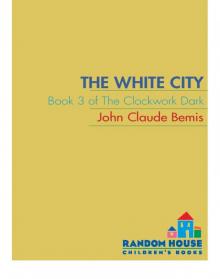 The White City
The White City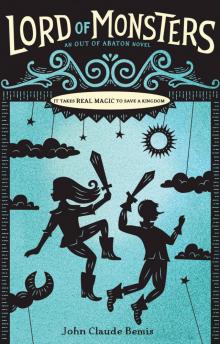 Lord of Monsters
Lord of Monsters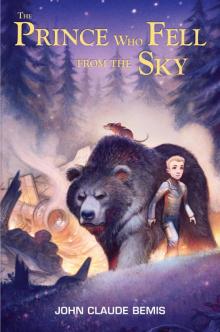 The Prince Who Fell from the Sky
The Prince Who Fell from the Sky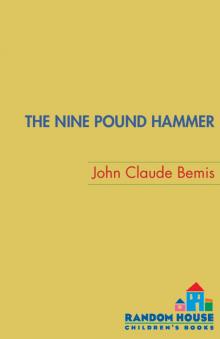 The Nine Pound Hammer
The Nine Pound Hammer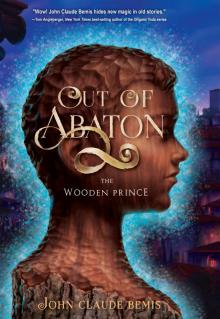 The Wooden Prince
The Wooden Prince The Wolf Tree
The Wolf Tree